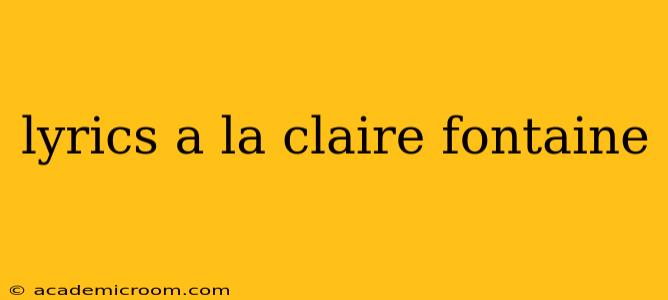"À la claire fontaine" is a classic French folk song, beloved for its simple melody and poignant lyrics. Its enduring popularity stems not only from its musical beauty but also from the evocative imagery and themes it explores. This post will delve into the lyrics themselves, explore their various interpretations, and examine the song's rich history and continuing relevance.
What are the Lyrics of À la Claire Fontaine?
The lyrics vary slightly depending on the version, but a common rendition translates as follows:
À la claire fontaine, M'en allant promener, J'ai rencontré l'amour, Qui m'a fait jurer.
Jurer, jurer, que je l'aimerai, Jurer, jurer, que je l'aimerai. Jurer, jurer, que je l'aimerai, Jusqu'à la mort du monde, Jusqu'à la fin des temps.
À la claire fontaine, M'en allant promener, J'ai rencontré la mort, Qui m'a fait jurer.
Jurer, jurer, que je mourrai, Jurer, jurer, que je mourrai. Jurer, jurer, que je mourrai, Jusqu'à la mort du monde, Jusqu'à la fin des temps.
This translates roughly to:
At the clear fountain, While going for a walk, I met love, Who made me swear.
Swear, swear, that I will love her/him, Swear, swear, that I will love her/him. Swear, swear, that I will love her/him, Until the death of the world, Until the end of time.
At the clear fountain, While going for a walk, I met death, Who made me swear.
Swear, swear, that I will die, Swear, swear, that I will die. Swear, swear, that I will die, Until the death of the world, Until the end of time.
What is the Meaning of the Song?
The seemingly simple lyrics hold a depth of meaning open to interpretation. The "claire fontaine" (clear fountain) acts as a symbolic setting for a profound encounter. The juxtaposition of love and death highlights the fleeting nature of life and the powerful emotions associated with both.
Some interpret the song as a reflection on the inevitability of death, contrasting it with the passionate intensity of love. Others see it as a commentary on the promises we make, both in love and in the face of mortality. The repeated "jurer" (to swear) emphasizes the weight and solemnity of these commitments. The "until the end of time" motif underscores the enduring power of these experiences, regardless of their outcome.
What does "Claire Fontaine" symbolize?
The "claire fontaine" itself is often interpreted as a symbol of purity, innocence, and the simplicity of nature, contrasting with the complexities of human emotions and the certainty of death. It provides a tranquil backdrop to the dramatic events unfolding in the song.
Is it a love song or a song about death?
It's both! The genius of the song lies in its ability to seamlessly weave together the powerful themes of love and death, highlighting their intertwined nature in the human experience. The song doesn't necessarily advocate for one over the other; instead, it presents them as equally potent forces that shape our lives.
What are the different versions of the song?
Numerous versions exist, differing slightly in lyrics and melody. Regional variations and adaptations over centuries have contributed to this rich tapestry of interpretations. Some versions focus more heavily on the love aspect, while others emphasize the inevitability of death. These variations only enrich the song's enduring appeal.
The History and Legacy of "À la Claire Fontaine"
The origins of "À la Claire Fontaine" are shrouded in some mystery, with its first appearance in print dating back to the 19th century. However, its structure and themes suggest much older roots, possibly connected to medieval traditions and folk songs. Its popularity has transcended generations, with countless adaptations and arrangements appearing in various media. Its enduring appeal stems from its ability to resonate with fundamental human experiences: love, loss, and the passage of time. It remains a cornerstone of French cultural heritage and a testament to the power of simple, yet profound, lyrics.
